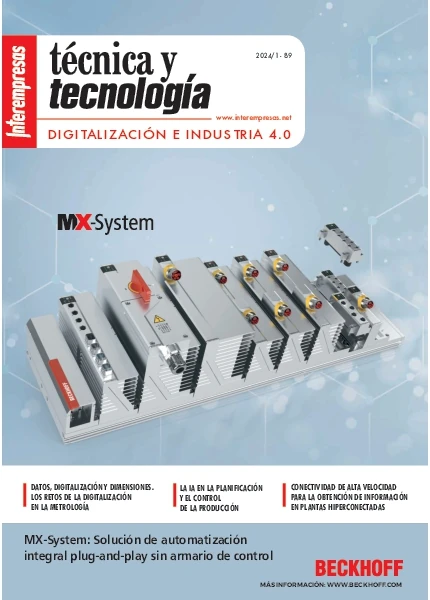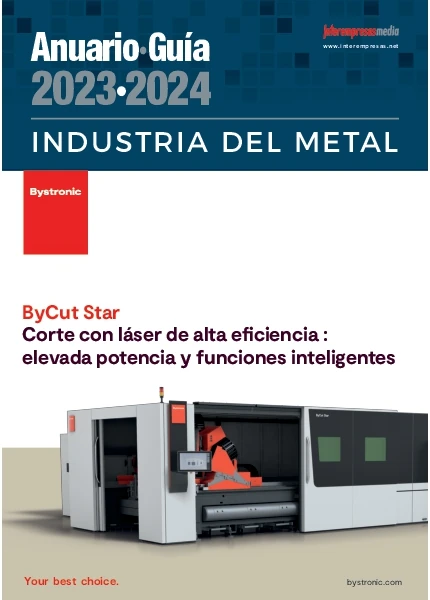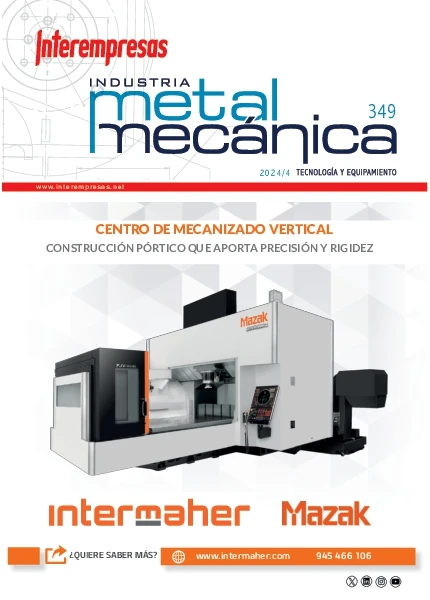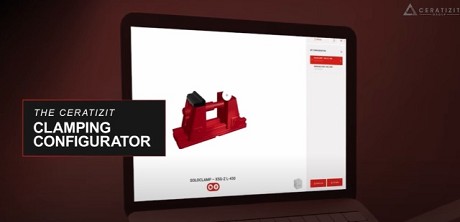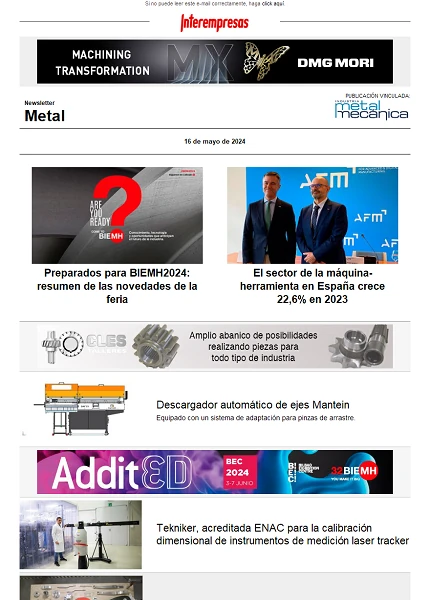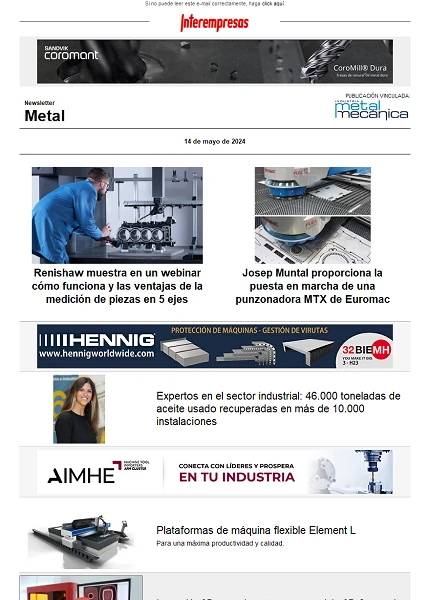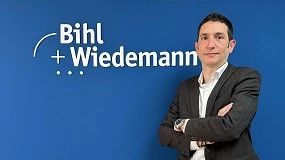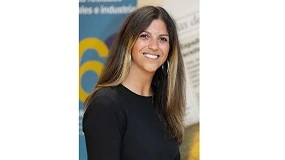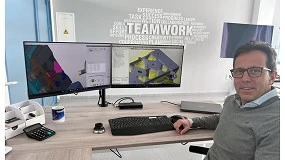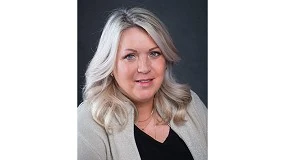Murcia premières the new Think Tank of Aspromec
20 March 2012
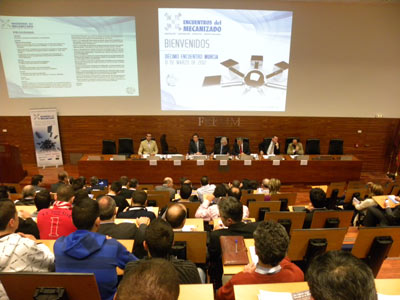
Like this, the first edition of the Meetings of the Mechanised of this 2012 celebrated in the capital murciana, in concrete in the headquarters of
The second sector of the Region of Murcia
Juan Antonio Muñoz, president of Fremm, opened the session appreciating to Aspromec, Association of Professionals for the Competitiveness of the Mechanised, the election of his city and his headquarters to organise the tenth edition of the Meetings of the Mechanised and more than the hand of Asemec, Association of Companies of Mechanised, Matricería and Coined and integral of Fremm and “one of the youngest of this house of the metal and that surprises us each day with his illusions, win to face the challenges of the market and, especially, the unit of his companies”. Muñoz remembered that with only five months of age, Asemec “was able to organise the I Auxiliary Sample Metal, registering a big success of participation when attracting to more than 800 visitors in so only 2 days. Besides —it followed the president— is an example for which are in Fremm, by his restlessness for looking for new markets, collaboration and cooperation and with a clear vocation by the internationalisation. Employers with this vigour do fault in time like which run, especially because we are speaking of a sector that receives in the Region of Murcia to some 180 companies employing to some 1.000 workers”. Muñoz remembered the support that gives to the industry metalmecánica, the second sector with greater weight in the regional industry after the agroalimentaria.
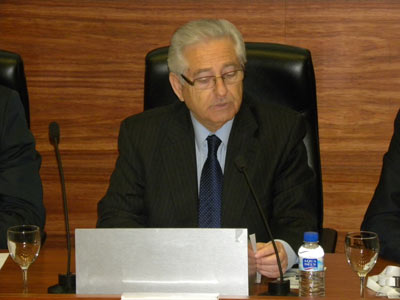
Juan Antonio Muñoz finished his parliament showing his gratitud to the two tractor trucks companies murcianas participants, Himoinsa “tied to this house for many years” and Navantia “company of international projection, pride of our region and particularly of Cartagena”, in addition to showing his conicidencia with the work of Aspromec, especially “in looking after the projects of innovation, cooperation, contacts and new markets to follow promoting the development in our surroundings there where are, do or no good time for the businesses. Between all have to contribute to carry out the business fabric in the measure that touches us”. This support showed it also in his intervention Jorge López Sabater, president of Asemec, the one who ensured that it splits of the fault of the creation of the association that chairs is precisely of the forum organised by Aspromec: “two years ago, when we still were not constituted like association and heard to speak on some Meetings of the Mechanised in distinct cities of Spain, arose the initiative between companies of the Fremm to work jointly in profit of the sector”. López affirmed that one of the aims that decided set up from the Association of Companies of Mechanised, Matricería and Coined of the Region of Murcia was to receive like hosts “one of the Meetings of Aspromec, as we are conscious of his quality, of the utility that have for our sector and, especially, of the good do of his members”.
After the president of Asemec, took part one of his members, Matías Javier Alacid, with the report ‘Guarantee of success in the productive processes'. With the sentence “The knowledge of our sector is the guarantee of the success”, Alacid claimed the quality of the SMEs of his association and his technical and professional qualification to carry out any project: “we Believe from Asemec that have sufficient means between all the associated to be able to develop any project of envergadura and finalise it successfully, from his beginning, until the set up. We are 44 companies associated, for which the most important is the technology and the technical knowledge and the capacity to give solutions to the problems presented with the lower possible costs”. For this, Asemec, founded in 2010 in the breast of Fremm, offers machining centres, of cut by laser and folded, matricería, marroquinería, coined, design of moulds and engineering, “where all can contribute ideas and solutions to the projects”. Likewise, Matías Alacid did upsetting in a basic element in his association, also extensively claimed in the Meetings of Aspromec, and one of the critical points of the back Think Tank: the cooperation “The collaboration between the associated can help us to go in in new markets, to defend the common interests between the associated and think that the result is a greater competitiveness, that repercute in the quality served to our customers”.
The member of Asemec also explained the diverse activities that organises, between them the I Auxiliary Sample Metal, where exhibited products, advances and developments of the workshops murcianos, or courses of learning, as one of technical English adapted to the sector of the mechanised.
After the intervention of Alacid, the president of Aspromec Ramiro Bengochea recognised the work of Asemec in favour of the mecanizadores: “it Is very difficult to find an association that have so well segmentado this sector. It is not a trivial subject, because one of the conclusions that have taken out in our path is that the one of the mechanised is a sector that some consider ‘unseen', as if it did not exist. The companies of the mechanised are used to to be mixed and classified in sectors of activity, usually focused to products, but the activity of the mechanised like such is not official and have associations or federations like Fremm that classify the mechanised and give him his importance and create an association focused to the real problems of the mecanizador, is all a value”. Also it valued the effort of the association for offering a course of English to the mecanizadores, remembering that, according to the report Aviva, “89% of the workers of this sector do not speak English”.
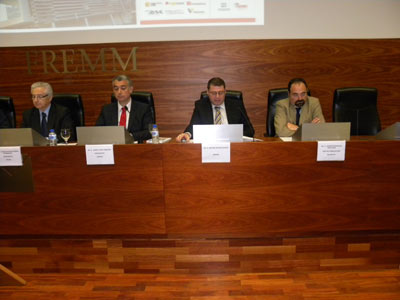
The experience in the global market of Himoinsa
The director of Engineering of Himoinsa, Manuel Sánchez Bada, spoke on the ‘business Experience in a global market' of his company. This company murciana, that in 2012 fulfils 30 years, is a leading company in the international field in the manufacture of power generators and towers of lighting. His projection goes through to have 8 centres of production in 6 different countries as well as 10 commercial subsidiaries and presence in 120 countries. Sánchez Bada wanted to share the vision of his company, the key points that have carried to this familiar company to his privileged position. “Those that conform it are especially proud of his competitiveness, so much national, because we think that is a referent for the sector, like international level, where is very very conditioned and competing in more than 100 countries”. These “unseen values”, as it defined them the director of Engineering of Himoinsa, go through to take into account “operative appearances so important like the improvement of the competitiveness, of the processes, learning and better aprovechamiento of the resources”, but also a very important part of strategy, “because we have to take decisions for afterwards with this operative reach our aims. It is important to have aims and focalizar very where have to direct our efforts”. These efforts, in the case of Himoinsa, centre in three key points: internationalisation, quality and specialisation.
In the case of the internationalisation, the company murciana already directed his look to the outside when anybody spoke still of the need to export. Sánchez revealed that “from always” only 40% of the turnover is in businesses inside Spain. From 1995, Himoinsa began to “invest resources to go out to the outside”. In this way, the company has productive centres, in addition to in Spain, in France, EE UU, Argentina, China and Indian. By his part, the subsidiaries commission to develop the business according to the area where installs , looking for providers and companies of local technical assistance. The productive subsidiaries also are commercial subsidiaries, as the one of EE UU, in addition to pure commercial subsidiaries like the one of Mexico and Panama. They are planned new subsidiaries in Angola and United Kingdom. Sánchez Bada remembered likewise that, although Himoinsa is free and does not belong to any big corporation generadora of power, always looks for alliances with important marks for punctual collaborations.
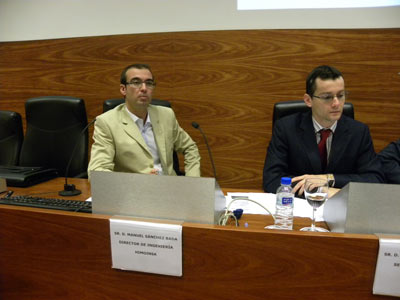
Regarding the factor of the specialisation, Sánchez remembered that in his sector the main difficulty in competing in a global market is the different technical possibilities that it can offer a generator in the different countries: “Voltages, frequencies, different uses and habits of the customers and especially there is a lot of competition in the price of the market”. With regard to this, Himoinsa did not decide to compete by price but by “the singularity of the product”. For example, the bodywork of the mark murciana —red with the black chassis— “marks the difference regarding robustness and aesthetic. It did a different bodywork to what there was in the market —remembered Sánchez Bada— with an easily recognizable aesthetics and very headed to the markets for hire, with big accesses to the engine and with components that can separate of simple form for his maintenance. Quickly this had his result with the available increases”. But the best example in the specialisation of product are the towers of lighting of the company. When being a seasonal producer, in winter these towers offer a lot of more profitability. Himoinsa Contrived a system modulate whereby his power generators can use like such during all the year and in winter incorporate them in his towers of lighting and take him out like this split in any station. “This is a very strategic factor, because the products have to be thought to do business, having the clear ideas from the beginning”, sentenced the director of Engineering of Himoinsa.
Finally, the factor of the quality in Himoinsa defines like “vertical manufacture”, that is to say, develop entirely all his product. The company develops so much the electronics equipment dealers equipment dealers “to which have contributed all our experience and have adapted it to our system of manufacture”, as to robotización and mechanisation of the process of the treatment of the metal of the chassis. This can extrapolate to his plants of manufacture in the outside because “when we have implanted us was, our strategy is to carry us always all ours know how, one of the guarantees of success that does not be used to achieve when they mount any business went”. His plant of China, for example, allows to attack much more directly the market of Asia and Australia, with terms shorter and the best of the qualities and service. “The can do perceive to the customers that the service, the answer and the solution are immediate, is fundamental”, added Manuel Sánchez Bada.
Technical service for all the life
Navantia, public company pertaining Spaniard to the Sepi (dependent society of the Ministry of Economy and Inland revenue), went the following in contributing his testimony in the Meetings of the Mechanised of Murcia. The company, first dockyard in Spain, third in Europe and fifth in the world, is a referent in design and construction of military fuselages and civil fuselages of high technology, design and manufacture of systems of control and fight, repairs and transformations of military and civil fuselages, support to the cycle of life of his fuselages and systems, as well as in the manufacture of motors diesel and of turbines. Precisely of this unit of production of Motors of Navantia participated in the day María Antonia Gómez, boss of Production, and Pedro Rodríguez, boss of Manufacture.
The unit of motors devotes to the manufacture, sale, installation and cycle of life of systems of motors of 4 times, for his application in propulsion and generation on board, plants of generation estacionaria and propulsion of trucks of fight. María Antonia Gómez explained that the catalogue of motors Navantia arrives until the 15.000 kW and that the company has agreements of collaboration with the main manufacturers of motors of the sector: MAN Diesel (from 1965), MTU Friedrichshafen (1972) and Caterpillar Inc. (from 1991).
The unit of motors has a section of smelting with a maximum capacity by colada of 60 tonnes and an annual capacity of 900. The line of setting has a surface of 5.000 square metres and bases in a system of manufacture based in the modularización to ensure term, cost and quality and increase the value added.
Gómez explained also the details of what his company calls ‘cycle of life', this is “once manufactured the engine, Navantia follows supporting to the customer until the product give of drop. The customer forgets of the engine and we ensure him that this goes to comport like the first day and goes to go adapting to the operation of the day in day out. We adapt his maintenance to his real situation depending on where was operating and the peculiarities of our customers”. The guarantee to provide an integral solution for the sostenimiento of this engine goes through some on-line sensors installed in all the fuselages with motors Navantia. “The sensors go on-line to a satellite that works for the Spanish Navy. The information of these sensors arrives to Navantia and our technicians and engineers can anticipate like this to any problem”. The control to real time of all the information of each engine that has manufactured and installed in the fuselages allows a service of maintenance in 24 hours in all Spain and in 72 hours to any point of the planet to solve any problem that have.
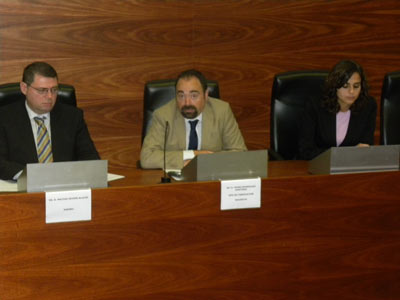
By his part, Pedro Rodríguez Martínez, boss of Manufacture of Motors, explained the details of the area of Mechanised of his factory, with flexible systems of manufacture of pieces of high value added based in the modularidad of machines, tools and devices. His park of machinery comprises so many conventional machines, with capacities of mechanised of pieces until 12 metres of length, like machines CNC with capacities until 8 metres.
A very important point that stood out Rodríguez is the one of the quality: “Our customers are not to the use. The certifications of quality for destined products to the military world are much more exhaustive. It is rare the month that do not have auditss of systems or of customers”.
Another factor to stand out by the boss of Manufacture of Motors was the “vocation by the learning” of Navantia. Although in 1991 it closed the school of aprendices of the company, follow giving courses of learning and recycling to all the operarios thanks to the support of the European bottom for the nautics sector. “All suffer to finals of the 90 the fault of vocation in the sector”, related Rodríguez. Of the 91 until 2006 roughly went hard years because they did not find operarios qualified. From 2006 it began to work with polytechnical centres like the one of Cartagena or the UPCT, with scholarships and conjoint studies”. Pedro Rodríguez also explained how try to wake up vocations between the more youngsters receiving visits of students of THIS and institutes of all the Region.
Space Think Tank Aspromec
After the presentations, Aspromec premièred in Murcia his new initiative Think Tank, the new format of debate based in the feedback centred in critical points that the association has distilled of his recent study Aviva. In this case, Murcia received nine of the ten planned debates directed by members of the managerial board and sponsors of Aspromec.
Subject 1: ‘The cooperation between SMEs of the sector like road of integration of technologies'. Directed by José Antonio Gómez Vadillo, adviser delegated of Aleacción Coaching and Quality consultancy S.L., quality consultancy inside the Group Vadillo specialised in mecanizadores
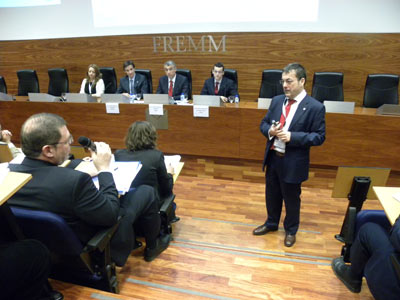
The project Aviva reflects that 52% of the companies of the sector has a little integrated cheese cheese structure to attend the demand of the market: delivery of complete mechanical groups.
These companies can undertake a process of investment that them capacite to achieve the structure sued, what involves an important financial risk, in the supposed that they find the financial agent that support them. Another road is to work a strategy of alliances or cooperations that allow to integrate several technologies to the project and like this attend the demand of the customers. This strategy has a lot of advantages but bumps frontalmente with cultural problems and of another type that do this very interesting debate.
Gómez Vadillo began his presentation ensuring that the “brave decisions give big results” putting of example the film ‘The artist', film dumb and in black and white that has achieved eight prizes Oscar this 2012. “A brave decision would be to cooperate. Why we do not dare to cooperate? It is a brave but safe decision that gives resulted”. Next, the manager of Aleacción contributed more data launched by the study Aviva:
24% of the companies identify the cooperation like key factor of competitiveness. 64% of the companies have not done never at all to cooperate. 50% is had to cooperate. 98% of which have cooperated certify that his cooperation has been a success. “Probably these that have cooperated are those that have carried better the crisis” ensured Gómez Vadillo.
But “to cooperate —remembered Vadillo— a fundamental key is the illusion to generate a new project. To cooperate is very important ‘to look for girlfriend' and ‘enamorarte'. The problem is that we can have fear to initiate this relation. But those that have married us or those that live in couple, this phase of initial cooperation had to develop it”.
In the debate took part also Matías Alacid that affirmed that from his association, Asemec, already is cooperating between the associated. “You have a competitive advantage: 80 companies of mechanised in an alone region, are next and few”, affirmed Gómez Vadillo. The own Alacid explained his experience of cooperation to implant a system of childish game in the American market. In the cooperation joins technology, mechanical and engineering. Vadillo Remarked besides that this is a “product that sure that it does not have to see with the initial product of the company. It is necessary to take into account that the products of the mechanised are used to to have little cycle of life: if we do not change them, they go to disappear”.
Alacid Remembered that Asemec is realising a course of English because “it is imposing in all the businesses that export . Without export there is not life neither business. We are not exporting but are part involved in the exporting companies of the region. The do a course of English to know the name of the materials that use is a form to collaborate and generate this process”. Gómez Vadillo remarked him that if the main industry murciana is the agroalimentaria and his main market the foreigner, “if the second sector in importance are you, the same could it use like bridge of link the international experience of the sector of the fruit. The cooperadores, in addition to our own sector, can be of other next sectors. You are an exporting province, have positive experiences to go out to out to sell” sentenced the adviser delegated of Aleacción.
Subject 2: ‘Learning of directors and employers to face the new challenges of the sector'. Directed by Swen Hamann, general director of Zoller, specialised in the measurement of tools
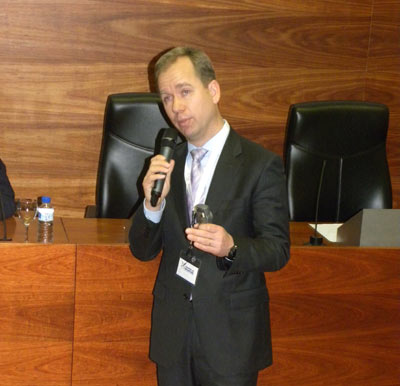
Of the project Aviva obtains that 83% of the companies of the sector are directed by the owners and that 70% of the directors of the companies have not received learning in steering and administration of companies or, if they received it do not apply it.
However, the new challenges to which confronts the sector need managerial very formed that they know to understand the complexity of the new surroundings and that take decisions so that his companies take out the maximum split to the changes in which we find us immersed: consolidation of the sector, specialisation of the demand, global competition, employed with low learning and high expectations, difficulties in the financials, etc.
In the debate, in front of the question of Hamann “think that it does lacking learning for the directors?” Alejandro Arjona, general director of Tebis affirmed that “sometimes in Spain think that the employer wants to receive a wage to final of month and with this happy”. On the areas of interest for courses, Roberto Hernando, general director of Intermaher, added: “The same the first course that would do fault would be one of valentía and prowess because many times it does not know what has to do and does not do it simply by fear to make a mistake ”. By his part, Miguel Ángel of Ortúzar, of QSM-GPROY affirmed that many times it would be necessary a “course of analysis of costs, that know how much costs an hour really”. The last question that Hamann headed to the assistants was: “How much costs you keep your cost every year? A study shows that between 10.000 and 20.000 euros. In EE UU says that each director would have to invest at least so much in his learning as in the maintenance of his car”.
Subject 3: ‘Need of change of strategic profile of 44% of the companies of the sector to end to reach a similar state to European countries more competitive'. Presented by Roberto Hernando, general director of Intermaher, distibuidor exclusive from 1975 of the Japanese mark of lathes and machining centres CNC Mazak
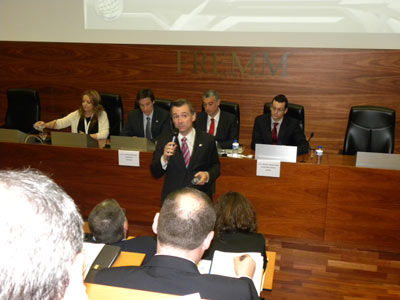
Of the project Aviva extracts the distribution of the companies in Spain regarding his strategic profile in comparison with other European regions. It concludes that 44% of the companies has to modify strategy, so that 19% has to happen to compete with an own product and that 22% has to integrate to be able to deliver to his conjoint customers complete mechanics. Splitting that 87% of the companies of the sector not even follows a determinate strategy, the subject to debate has a vital importance and can have connections very interesting with other subjects of the ThinkTank.
As it presented Roberto Hernando, “one of the conclusions of the project Aviva stands out that the mecanizadores have some restlessness on how are doing the things, that to ‘find the treasure', that anybody knows exactly in that mountain is, have a slight perception that they would have to operate of a different way to the that are doing it now”. And if sure enough, the companies think that have to change something of his organisation, “think that this analysis can do it internally, looking to the navel? Or perhaps to do this analysis, it is necessary to know that it is happening in Europe and in the world?”. According to his criterion, Roberto Hernando defined like this a ‘intelligent company': “ resume in three characteristics: it has perfectly identified all the sources of information that are of interest to have relative information to his business, and has defined each how long goes it to chequear and who is the person of the company that goes to define these sources of information and each how long. The second point is that it has an able system to analyse all this investigation of market in base to some basic criteria and selects a series of alternatives that goes to execute to the practice. And the third step is that, besides, is able to carry to the practice this option selected, of an orderly and consistent way, but always keeping in the pocket other interesting alternatives”.
Miguel Ángel of Ortúzar, director of QSM-GPROY, did the reflection that if the billed speech of the need that 44% of the companies change his strategic plan, “understands that these companies have a strategic plan, because the majority of the employers do not devote a day and an hour of his diary to reflexionar on his company and much less to a strategic plan”. By his part, Ramiro Bengochea put the example of Himoinsa, a familiar company murciana that has triumphed out of his borders thanks to tracing a strategy of internationalisation and specialisation, “know who is your customer and what needs. Obviously all know our circumstances, but in a very elevated number of companies, something have to change”.
Subject 4: Excessive consumption of resources in the financials of the circulante that weakens the companies and limits his growth. Presented by Oriol Caballé, general director of Kromi, German company devoted to the ‘tool manegement', the integral management of tools of cutting
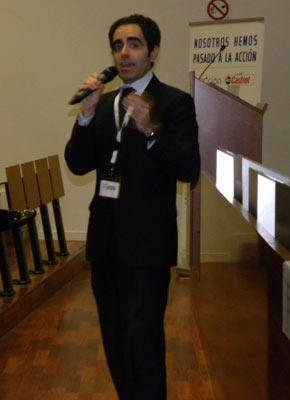
In the project Aviva appreciates some scales of payments of the companies of the clearly bent sector to his customers. This effect is due to the fact that the period of payment of the customers demora in excess. This generates a concentration of resources in the financials of the circulante and therefore little or invalid attention to the investment, that is what does that the companies can improve his competitiveness. This subject is the origin of big problems of the SMEs of the sector, and therefore the proposals that generate around him can suppose important improvements.
Oriol Caballé initiated his intervention remembering the limitation of credit to that see subjected the companies “that deepens in the difficulties to achieve financials especially affects to the SMEs by the endurecimiento of the conditions”. The first question to formulate is if the companies manage properly his capital circulante. “There is a first problem, and is the correct financial management of the companies, that goes joined to the correct learning of the directors in subjects of administration of companies. In base to studies, the financials is focusing to the quantity of circulante and no to the innovation; innovation that, on the other hand, is the base for the growth of our companies. The problem is that the financials received are allocating it to cover our needs of circulante passive”. Caballé Put a practical example of two societies to show which managed better his capital circulante, which allocates it to the innovation, to the talent, to the R&D and the investment and which to manage his needs of circulante. “The companies that allocate the financials to cover his needs of circulante can have a greater problem of morosidad for centring in a circulante very focalizado in his customers, what comports the need of financials no for the investment but to face up to his passive. To part, goes to affect to the cycle of exploitation, that is to say, since they go in our raw materials until they go in in process of production, store and sell . What minor was this cycle of export, our needs of financials will be lower. We will be able to devote the financials to the investment. Instead if it is very long, would need this financials to tackle the need of circulante”.
Roberto Hernando took part to remember the need of the companies to reduce his stock because “if we have one million euros in stock, is one million euros that can not use for nothing”.
Caballé Continued contributing some of the conclusions extracted of the project Aviva: 35% of the providers have stipulated the time of payment of 60 to 90 days; “instead, only 11% of our customers pays us in this period, 30% of 90 to 120 days: problem very grave that affects our liquidity and possibilities of investment”. The half period of payments stipulates in 106 days, the European average is of 56, “is also a structural problem”.
On this subject, took part Matías Alacid of Asemec ensuring that “if I have a customer that pays to 120 days, I have to guarantee me the operation and finish going to the 120 days”. On the Law of the Morosidad, Alacid ensured that “it has to pose a law that no only was a paper form in a bulletin but a law that if it does not apply , have real penalty. We are in a moment in that neither the Administrations neither the State are in situation to say that this has to do like this, because they are the first in not fulfilling this norm”.
Subject 5: ‘Approach to the market and strategic planning of the companies of the sector'. Directed by Ángel Hernández, boss of Division of Metal of Interempresas, platform of communication for companies and professional
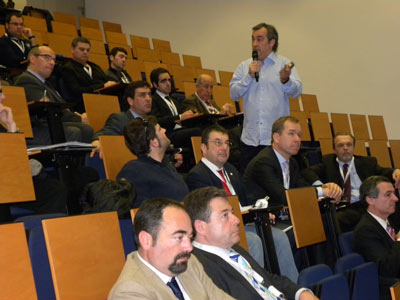
Of the project Aviva extracts that 79% of the companies do not have a plan of marketing. Besides there are other data that indicate a low approach to the market, as that 40% of the companies do not have a catalogue, “resorting to the simple explanation of ‘as I do not have an own product in series'”, commented Ángel Hernández. Besides, 22% does not have page web, “and of these a height so much percent does not update it never” that 68% has not participated in fairs or that 55% never has realised advertising, “not even help to the instrument cyclist to put a poster in the bar of the corner of the village where have the workshop”. With these data is evident that the sector needs stimuli that focus him to a more centred activity in the customer and market in place of only in the production. Of this subject can extract conclusions to operative level that give fast results to stimulate the sector.
“This carries us to a consequence tremenda” commented Hernández. “We are practically in 80% of companies that do not have something that quoted previously: a strategic plan. The sector of the metal is an essentially productive sector and technician that has centred his sight in what it is the production and has forgotten of something that is basic in other sectors that is the market. We have renounced to the market totally. The companies of the sector no only have to centre in producing some pieces but they also have to go out to sell them”.
In front of the question ‘Why follow centred in producing and no in selling?', somebody in the room answered: “Perhaps because until it does not do a lot, to the companies bought them without that they had the need to sell. Until two years ago it was not necessary to sell, sold without effort”. Ramiro Bengochea added: “Also, the sellers are badly seen. It has more ‘caché' produce that sell”.
“Also is very common the be so engullido in the day in day out: production, financialss, personal, that the employer simply loses the perspective of his business, by where has to go, by where has to evolve. Only it thinks in the day in day out, in producing and produce”, added one of the mecanizadores assistants. To what Ángel Hernández answered: “By a lot of that produce, if I do not sell do not do at all, if my company is not in the market, is not competitive, remains desfasada totally”.
What needs to happen the attention of only the production to the market? By where begin to change? Miguel Ángel of Ortúzar insisted in the concept of the ‘diary' of the director: “I would begin for doing a diary and think how many hours go to devote on sale and to the administration. Here it is the problem, that anybody carries diaries. Because the most limited resource that there is is the time. How much cost to go out to sell all the days? There are a lot of employers that do not pay commissions because they say that they do not have commercial costs and this is not true, because it is not quantifying his time. By where I begin to change? Do you a diary”.
Francisco Javier Salorio director of Shopping-Outsourcing of Indra added: “To sell is essential to know what is what the market sues. The same a company is empeñada to be followed doing a product that probably no longer has demand in the market. To change it is necessary to know what is what sues ”. To what Ángel Hernández added: “it Is very simple, analysis DAFO, analyse me to my same, my competition, the market, which are my fortresses, my opportunities, my weaknesses. This involves to analyse intern and externamente, taking decisions respecto if I want to compete like leader, or like second, or simply forget me to litigate by the first positions and devote me to litigate in lower battles. And finally, with the decisions that take, something transcendental nowadays: communicate choosing the message that wants to move, to who wants to move the message, how wants to move using the most adapted means to what I need. It is on what have to reflexionar so that this approach of strategic planning revierta and happen of the chip produce to the chip sell”.
Subject 6: ‘Need of qualified workers and engaged to work in the sector'. Presented by Alejandro Arjona, general director of Tebis, company of software that develops systems CAD/CAM for the manufacture of models, moulds and coin
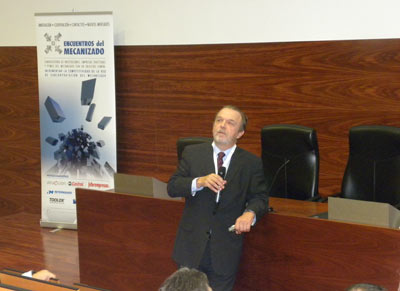
According to the surveys realised in the project Aviva, 80% of the self-evident directors have problems to find suitable personnel to the profile that need. This data does evident the need of a change of attitude by part of the public servicy and of the agents that represent to the sector to attract talent or so that the plans of study and of recycling of employees of other sectors are more effective. Other data that launches the report Aviva is that 26% of the companies has a plan of learning in the company; 15%, has a plan but does not execute of agreement to the scheduled; 39%, does not have a plan and the learning improvises along the year; and 18% does not give hardly learning. “The does not prevail in these conclusions, is something that it is necessary to treat to change”, sentenced Arjona.
In front of the question of Arjona ‘Which is the reason of not giving courses in his company?', somebody between the public answered “Perhaps the need to produce, the same concept of production. In appearance, the learning is a cost without return”, to what Manuel Lorenzo, technical secretary of Asemec, retorted: “Our manager of learning has a poster in his dispatch with the sentence ‘If you think that is expensive the learning, looks to see how much costs the ignorance'”.
Roberto Hernando, of Intermaher, affirmed that it is something inmanente to the ‘Spanish character'. “We tend to precipitate us with the open shirt, to resolve the problems to the brava because we think that to stop us to reflexionar before resolving a problem is a loss of time. There is one some consciousness that we can to begin to do, that are very smart and that on the fly we will be able to go taking out pieces”.
The debate also derived to the model learning that gives in Spain. It heard more than a complaint on the current academic system, “in that all the world believes to know of everything and in reality does not know of almost at all”. Swen Hamann Contributed like example the dual system German, a strongly linked learning to the company, in that the student paginates his academic course with the business practices. Besides, Hamann added: “We like employers would have to give him value to the learning. I know employers that give it like stray time”.
By his part, Juan Martino, of Toolox, affirmed that “there are people very formed to the one who no gives him an opportunity”, to what Matías Alacid added that “it is true, there are a lot of people in the unemployment very very formed and that like employer would be had to take out two people of your staff by this person, and also a lot of fixed people in staff of companies without learning whose dismissal would have a very high cost and that is very comfortable where is”. Alacid Also claimed the continuous learning inside the own company “so that the worker know more and produce more”, to what Ángel Hernández added that what “was heritage of doctors and lawyers”, this is the permanent and continuous learning, is extending to all the sectors, but that it is necessary to motivate to the employees so that they follow forming to do his every time better work.
In this section also treated the subject of the fault of qualified professionals in as which sectors. It explained a case of a company that needed a delineante industrial and had to form delineantes of the branch of the construction to achieve what needed. The representative of another company explained the tremendas difficulties for finding a person in practical heading to several centres of learning, since the answers that received in the majority of the cases was “have removed us the subsidies and as we have to pay us the fuel, does not be worth it us”.
Also remembered the case of Navantia, that had to close his school of aprendices by fault of vocations. In front of the question of Arjona ‘Why is not attractor trucks the job of tornero or fresador?' A student assistant answered: “Yes that it is attractor trucks, but is a so wide job that many times what costs is to adapt to the type of work that does in the company. They do fault the practices in the company and adapt the learning to what sue the employers of the sector”.
Subject 7: ‘Internationalisation of companies of previous outsourcing integration of technologies, well via cooperation or via own integration'. Presented by Juan Martino, of Toolox-SSAB, skilled Swedish company in steel
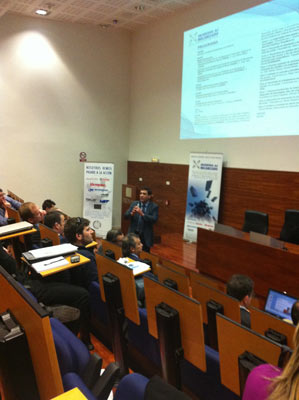
Of the project Aviva deduces that the majority of the companies still centre his activity in a local market, however, the fault of quality and quantity of the tractor trucks effect venue forces them to focus his aims to international markets to be able to keep his structures.
So that the companies of the sector are competitive in international markets have to modify his strategy, especially the companies that traditionally have devoted to the outsourcing. With this ThinkTank pretends generate initiatives that improve the possibilities of the companies to compete internationally.
Juan Martino initiated his intervention showing the image of a Spanish company in a foreign fair, in concrete in Germany. To explain how has been able to arrive until here a Spanish company and how has achieved customers in Germany, Martino asked to the assistants: “What are doing different to the rest of the companies? We can offer something different, an innovation? We can offer some processes that improve our costs?”. Besides, it put on the table the subject of the language, “a so basic appearance and elementary that even would not have to speak of this” and also of the commercial risk that has to face a company: “In addition to having ideas and the technical capacity to export, it is necessary to have an organisation adapted to this approach. The people has to speak languages, know the financial processes of the export, customs, transports, special taxles, idiosyncrasies of local markets. The previous work to pose the export is long. We can not say that the month that comes go to export, it is necessary to do a previous work”. For this put the example of institutions that help to the companies to export, as it is the Forum of the Internationalisation of the Company, dependent of the Institute of Romento of the Region of Murcia.
Manuel Lozano, of Asemec, added that Fremm has his own department of Internationalisation, to be able to relate companies with organisms that there is in the Region in subjects of export like the Promotion, the Cameras of Trade and the Icex.
Subject 8: ‘Need of innovation in product of 19% of the companies of the sector'. Presented by Ramiro Bengochea, general director of WNT Iberian, specialist in supply of tools for the mechanised inside the Group Ceratizit
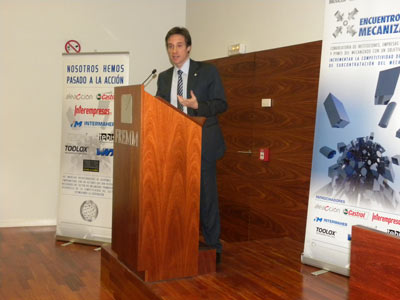
According to the project Aviva, 19% of the companies of the sector would have to realise a process of innovation more or less complex to end to create his product or own mark. Of this form would generate greater income in the sector and to his time revitalizaría the tractor trucks effect venue.
One of the greater obstacles to this innovation is the fault of structure of the companies of the sector and the little connection with the technological agents. From this ThinkTank can generate proposals for the realistic innovation with the possibilities of the companies of the sector, that serve to his time of engine for revitalizar the activity of the local market.
Ramiro Bengochea initiated his presentation with the sentence of Einstein ‘If you want that the things follow the same, go on doing the same'. On this 19% of companies of the billed, that represent some 1.140 in all Spain, “would be exporting his own products and would be realising a tractor trucks effect subcontracting. In consequence there would be an effect multiplicador in the activity. We have to try that our companies innoven in product”.
But, how can one SME or micropyme of the mechanised innovar in product? Manuel Sánchez Bada, of Himoinsa, explained it with a graphic example: “For innovar in a product, the first that we have to have clear is how want to and how can compete. A good simile is a restaurant: you have a kitchen, that is the production, the waiters that are the commercial and have your letter that are your products. And all influence enormously in all. If you have a good canteen and a lot of waiters but do not have adapted the kitchen, your company does not go to throw. It is necessary to know exactly in that it goes to compete: if it goes to be in price, in delivery… Is fundamental to have clear in what go to compete, and which will be our competitive advantage”.
The vision of the companies contratantes, the tractor trucks, gave it in this case Pedro Rodríguez of Navantia: “We are subcontratadores of your works and yours customers. At the end, all the world mechanises well: the majority of mecanizadores has a level of acceptable quality, are competitive, by what finishes for competing by the price and at the end, compete by the price only carries to the ruin. And you hurt you. The only form of innovar in your product is to grow and differentiate you regarding quality, regarding certification, regarding service. In any polygon 80% of the companies of the mechanised can manufacture me a piece that I want to. The big companies no longer are aleatherg price, are aleatherg something more: professional career, environingingmental certifications, etc. because of some form it is necessary to differentiate. I have been in the Basque Country and there of the 95 to 100% of the companies of machine-tool what are manufacturing is for export. In 5-10 years have given a brutal change. They sell technology, do not sell price; for price, the Chineses”.
From the public, one of the assistants added that “the companies of mechanised like us can not innovar so much in product as in service. We are so centred in the screw, the sheet or the piece that lose the perspective that our main product is the service and is missing us a bit innovar by this part, like improving in quality, terms, in contributing solutions to our customers. The screw is very easy to find in Internet to world-wide level, but the own yours product and different is your service”.
Regarding the subject of the innovation in the service, Ramiro Bengochea wanted to share the experience of a member of honour of Aspromec, a company situated in Valencia and Barcelona that finishes to open a plant in Germany and whose “differential product is the service”. This company, that devotes to do prototypes for companies of the car, has presented a lot of advantages regarding service with regard to his German competitors, by his approach to the flexibility of the service. “Precisely in what they criticised him the Germans, like the fault of planning or not having structured the production, he has turned it into a competitive advantage, focusing in his fortresses, no in his weaknesses”.
With regard to the innovation, but in this case in product, already aimed the subject during the debate 7, in which Juan Martino presented the example of a company of Barcelona that had triumphed inside and out of our borders thanks to a patent, “a very simple idea, that no had occurred him to anybody”, a hook of crane that differentiates of all the existent by a particular mechanism. This hook is automatic, download automatically without need that any operario have to approach to the load, increasing the productivity. To be able to produce this novelty, the company looked for mecanizadores local, but had metallurgical appearances and of calculations that the company did not have capacity to do. To resolve his technical problems, resorted to the University Politècnica of Catalonia, where achieved to give him a technical solution and convert this patent in ‘fabricable'.
In this way, Martino entered in the debate the importance of the independent technology centres and the universities, whose collaboration is especially valuable in cases of technical innovations of products. By his part, María Antonia Gómez of Navantia added that his company collaborates usually with the Polytechnical University of Catagena, for example assisting them in essays of broadcasts in motors or in essays of materials. In this sense, Martino also explained that SSAB, like steelworks, collaborates on time with technological and university centres that need to know, for example, possibilities of the welding of his steels. “We have to procure that they produce these collaborations between providers, technology centres and companies, subcontractors of companies”, added Martino.
Subject 9: ‘Quality and quantity of the tractor trucks effect in the sector'. Directed by Francisco Ortega, delegated of Sales of Castrol, lubricantes and industrial fluids for the mechanised
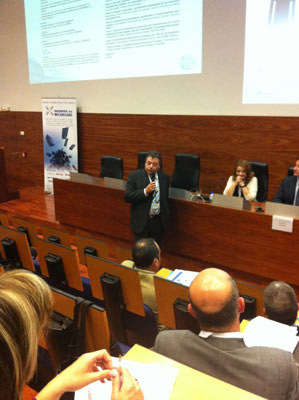
According to the project Aviva the characteristics of the local demand have changed in the last years. There is a tendency to that the tractor trucks companies go down his commitment with the network of local outsourcing, that added to the descent of national projects generates a big disproportion between offer and demand to local level. However, it exists some commitment by part of the tractor trucks company, implicit to the calificativo of ‘tractor trucks' to keep some activity in his surroundings. From this ThinkTank his can analyse how is this tractor trucks effect and how answers the company of local outsourcing. All this to end to launch proposals that benefit to both parts and therefore to the surroundings.
The delegate of Sales of Castrol Francisco Ortega began his presentation with the affirmation ‘The local tractor trucks companies are fundamental for the good operation of the sector… but can be a factor limitante for the sector'. In front of the first question formulated ‘Knows the employer of the sector all the requirements to be supplying of the tractor trucks company, or has the tractor trucks company a clear diagram to enter/desestimar subcontracted?', Ortega affirmed the need of the SMEs to know the market, what the tractor trucks company needs in reality. “We would have to know if this tractor trucks company is able to ‘agitate' to the companies providers so that they are able to change, so that they are able to differentiate and see what is what is aleatherg his tractor trucks company and, somehow, turn into a company that do not have the need to live of an alone tractor trucks company, or was, profesionalizarla and that it was able to turn into provider to world-wide level, that is to say, export”.
The second question that Ortega headed to the assistants was on if the tractor trucks had an end too cortoplacista, “that is to say, that only fix in the price of his provider. In the moment that the tractor trucks is aleatherg specialisation, that his provider speak English and interpret planes in foreign languages, is not it being. It is logical that a tractor trucks company want to have a network of strong providers”, to what Ramiro Bengochea added: “it Is a balance between having patience so that this network develop and not losing competitiveness”. “Yes —it added Ortega— but the profits of this strong network goes them to receive the tractor trucks company, knowing that they go them to offer competent products, technological innovations and that will indicate them possible problems in his pieces when it is manufacturing them”. Alejandro Arjona compared this relation between tractor trucks and subcontracted with the relation customer-provider: “Sometimes it sees to the provider like somebody to the one who take him out the best discount. Has to change this concept to see to the provider like a partner. In the case of the tractor trucks company and his provider, can say him how can improve his systems to do it faster or more economic. Facilitate the work can have the reward of a better price”.
Regarding the subject of the price, Ortega affirmed that “offer price is like saying that it offers something cheaper, no something of more quality. A thing is that the tractor trucks company want to that the mecanizador abarate his prices and another is that the mecanizador gather with the tractor trucks and propose him change the system of production to achieve abaratar the final price. They can be the two options and here is where goes in the communication between both”.
Ángel Hernández restarted the subject of the cooperation to face up to the demands of the tractor trucks companies. “The mecanizador sees many times that it exceeds him in dimension the capacity to realise changes to adapt and needs to look for alliances and cooperation. To the tractor trucks company goes him to give the same that it present one or four, whenever it resolve his problem. It goes to be simpler to solve the problems if there is a cooperation that if there is not it. And obviously it is difficult, by the idiosyncrasy that have, that four or more companies put of agreement. Surely this was the paper of the associations mediating to be able to give to the small companies a bigger dimension and can put in contact much more easily with big customers of the local field”. Matías Alacid of Asemec remembered him that his association puts his associated to disposal of any project “with the guarantee that can carry out”. But give service to a big company can have his difficulties, as for example, as it aimed Alacid, the adapt to the computer systems of a tractor trucks company. “It would owe to centralise everything in a system so that the employer or the SME could access to this type of program to manufacture, and perhaps the service would be better and cheaper. When they command you a drawing, command it to you in a PDF with heights milimetradas, with what the guarantee of manufacture is minimum and throw you almost four hours to draw this piece, that once manufactured slope 10 euros having him devoted 100 euros of work”. Javier Salori, of Indra, answered that when doing an outsourcing, his company always comments the computer package that has to use , “for example, ‘this have to treat it with CATIA'”. To what Alacid answered: “But which guarantees him dais to the SME? Because CATIA are almost 4 million pesetas a minimum package, and if only you will use it once with an alone provider of 2 millions, neither is worth it you buy it”. In this sense, Ángel Hernández of Interempresas concluded: “The communication no only is to offer things but also to sue, and this is something that by part of the tractor trucks companies is in his ‘has to' clarísimamente. His plan of communication is directed clearly only to the that sells and also would have to do a plan of communication to the that goes them to sell”.


